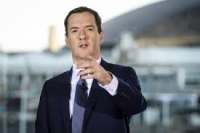Budget 2016 Nasty Shocks Ahead
Monday 14 March, 2016 Written by POLITICO
OSBORNE’S ALPHABET — A IS FOR AUSTERITY, B IS FOR BEARISH: George Osborne and his spin doctors clearly don’t like surprises. The U.K. chancellor of the exchequer has been busy preparing the markets, commentators and the British public for yet more austerity in Wednesday’s annual budget.
First, he issued a warning in The Sun on Sunday: In an editorial for the tabloid, Osborne said, the world is “facing its most uncertain period since the Great Recession” of 2008, before adding: “We need to act now rather than pay later.” http://bit.ly/24Y9oFK
Then he gave some numbers to the BBC: Osborne was a bit more specific with the BBC a few hours later. He told the Andrew Marr Show that he needed further cuts “equivalent to 50p in every £100″ of public spending by 2020, which was “not a huge amount in the scheme of things.” He declined to say whether he would raise taxes on fuel, a controversial issue. http://bbc.in/1U9G8YY
M.E. sideline: It’s all about the math. Osborne has promised to deliver a budget surplus by 2020. But an expected slowdown in Britain’s economy, largely due to turmoil elsewhere, has left him some £18 billion (€23.2 billion) short on the revenue front. His answer? Some tax hikes now, and more cuts later.
On the former, there is speculation of a tax on insurance premiums, an increase in the bank profit tax and the establishment of a link between inflation and fuel duties. On the belt-tightening, front, Sunday’s pledge of a 0.5 percent cut would add some £3 billion-£4 billion to the government coffers.
These may well turn out to be unpopular policies but the commanding position of the ruling Conservative party and the difficulties of the opposition Labour party under the left-wing leader Jeremy Corbyn mean that Osborne can afford to be tough.
The Europe angle: Not for the first, or the last time, Britain is out of sync with its European neighbors. On the Continent, as the Brits call it, there are growing calls for more fiscal stimulus (that is, government spending) to boost growth and relieve the European Central Bank from having to do all the heavy-lifting. The British government, however, is laser-focused on delivering a budget surplus.
OSBORNE GETS NEW TOP LIEUTENANT: Tom Scholar, who was one of David Cameron’s closest aides on the EU deal, is to become the top civil servant in the chancellor’s department, Treasury announced on Friday. He will replace Sir Nicholas Macpherson at the end of the month. Scholar was one of the favorites for the job alongside John Kingman, a top civil servant at Treasury. Scholar started out as an aide to Gordon Brown when he was chancellor and then prime minister.
Leave a comment
Make sure you enter all the required information, indicated by an asterisk (*). HTML code is not allowed.
Join
FREE
Here










